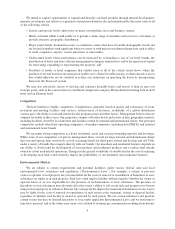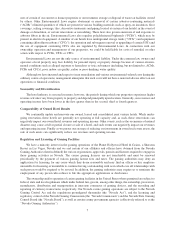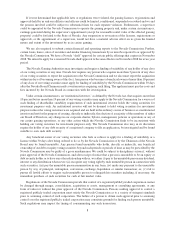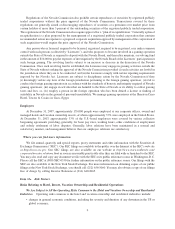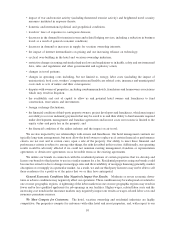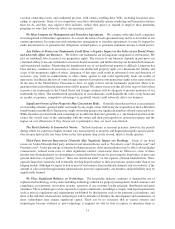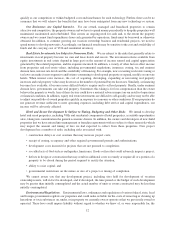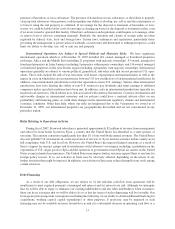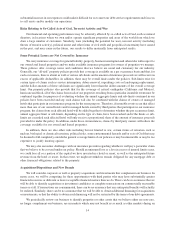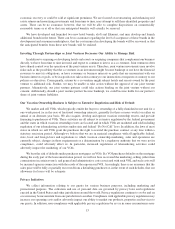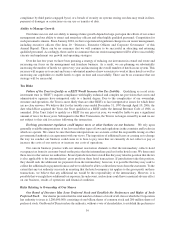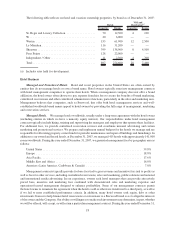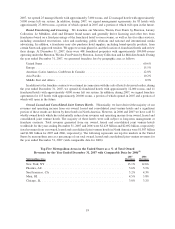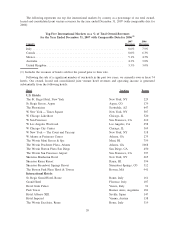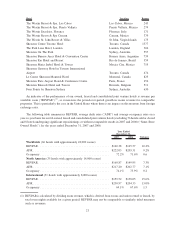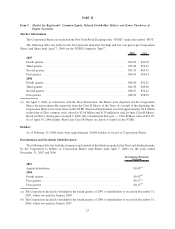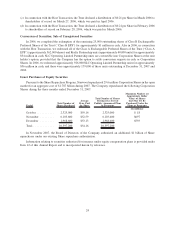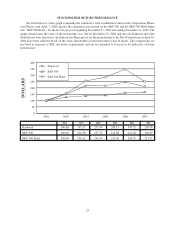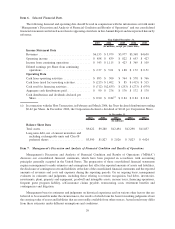Starwood 2007 Annual Report Download - page 80
Download and view the complete annual report
Please find page 80 of the 2007 Starwood annual report below. You can navigate through the pages in the report by either clicking on the pages listed below, or by using the keyword search tool below to find specific information within the annual report.compliance by third parties engaged by us) or a breach of security on systems storing our data may result in fines,
payment of damages or restrictions on our use or transfer of data.
Ability to Manage Growth
Our future success and our ability to manage future growth depend in large part upon the efforts of our senior
management and our ability to attract and retain key officers and other highly qualified personnel. Competition for
such personnel is intense. Since January 2004, we have experienced significant changes in our senior management,
including executive officers (See Item 10. “Directors, Executive Officers and Corporate Governance” of this
Annual Report). There can be no assurance that we will continue to be successful in attracting and retaining
qualified personnel. Accordingly, there can be no assurance that our senior management will be able to successfully
execute and implement our growth and operating strategies.
Over the last few years we have been pursuing a strategy of reducing our investment in owned real estate and
increasing our focus on the management and franchise business. As a result, we are planning on substantially
increasing the number of hotels we open every year and increasing the overall number of hotels in our system. This
increase will require us to recruit and train a substantial number of new associates to work at these hotels as well as
increasing our capabilities to enable hotels to open on time and successfully. There can be no assurance that our
strategy will be successful.
Tax Risks
Failure of the Trust to Qualify as a REIT Would Increase Our Tax Liability. Qualifying as a real estate
investment trust (a “REIT”) requires compliance with highly technical and complex tax provisions that courts and
administrative agencies have interpreted only to a limited degree. Due to the complexities of our ownership,
structure and operations, the Trust is more likely than are other REITs to face interpretative issues for which there
are no clear answers. We believe that for the taxable years ended December 31, 1995 through April 10, 2006, the
date which Host acquired the Trust, the Trust qualified as a REIT under the Internal Revenue Code of 1986, as
amended. If the Trust failed to qualify as a REIT for any prior tax year, we would be liable to pay a significant
amount of taxes for those years. Subsequent to the Host Transaction, the Trust is no longer owned by us and we are
not subject to this risk for actions following the transaction.
Evolving government regulation could impose taxes or other burdens on our business. We rely upon
generally available interpretations of tax laws and other types of laws and regulations in the countries and locales in
which we operate. We cannot be sure that these interpretations are accurate or that the responsible taxing or other
governmental authority is in agreement with our views. The imposition of additional taxes or causing us to change
the way we conduct our business could cause us to have to pay taxes that we currently do not collect or pay or
increase the costs of our services or increase our costs of operations.
Our current business practice with our internet reservation channels is that the intermediary collects hotel
occupancy tax from its customer based on the price that the intermediary paid us for the hotel room. We then remit
these taxes to the various tax authorities. Several jurisdictions have stated that they may take the position that the tax
is also applicable to the intermediaries’ gross profit on these hotel transactions. If jurisdictions take this position,
they should seek the additional tax payments from the intermediary; however, it is possible that they may seek to
collect the additional tax payment from us and we would not be able to collect these taxes from the customers. To the
extent that any tax authority succeeds in asserting that the hotel occupancy tax applies to the gross profit on these
transactions, we believe that any additional tax would be the responsibility of the intermediary. However, it is
possible that we might have additional tax exposure. In such event, such actions could have a material adverse effect
on our business, results of operations and financial condition.
Risks Relating to Ownership of Our Shares
Our Board of Directors May Issue Preferred Stock and Establish the Preferences and Rights of Such
Preferred Stock. Our charter provides that the total number of shares of stock of all classes which the Corporation
has authority to issue is 1,200,000,000, consisting of one billion shares of common stock and 200 million shares of
preferred stock. Our Board of Directors has the authority, without a vote of shareholders, to establish the preferences
16


